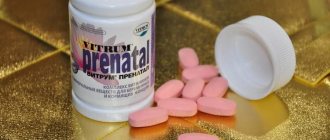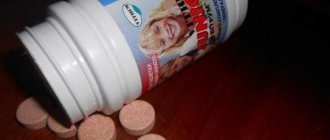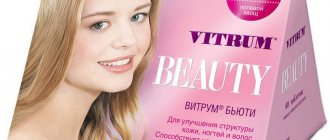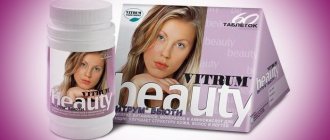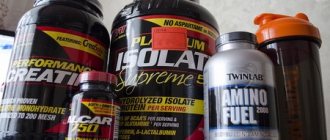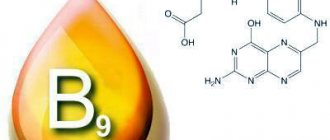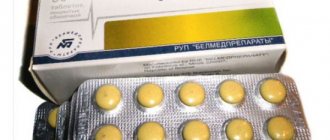pharmachologic effect
Helps improve blood circulation in the brain, increases the supply of glucose and oxygen to the brain, regulates cellular metabolism, improves microcirculation and blood fluidity, improves blood supply to blood vessels by dilating arterioles and increasing the tone of the venous wall.
Prevents the formation of blood clots, regulates the function of neurotransmitters. Provides an anti-edematous effect both in the brain and in peripheral tissues.
It is an antihypoxic agent , activates brain activity, increases learning ability, and improves memory.
Benefits and harms of Vitrum Memory
"Vitrum Memory" has positive and negative consequences of use, so you should definitely consult a doctor before use.
The main positive properties of Vitrum Memory are:
- improvement of intellectual abilities;
- speeds up thinking;
- improves memory and concentration;
- normalizes blood circulation in peripheral vessels;
- increases the effectiveness of therapy in the treatment of circulatory problems in the legs.
The negative properties of Vitrum Memory are:
- a large number of contraindications - ranging from circulatory disorders and digestive diseases to low blood pressure and blood clotting problems;
- side effects: headache, migraines, poor sleep, allergies and dizziness;
- with prolonged use, the substances accumulate in excess in the body, which can cause drowsiness and irritability, so you need to take long breaks between courses of use.
Where to buy, analogues
You can purchase Vitrum Memory at any pharmacy without a prescription. Ginkgo biloba leaves are quite popular all over the world as a treatment and prevention for various types of dementia. Most drugs contain 40 mg of extract, in contrast to Vitrum Memory, which contains 60 mg.
More affordable, cheap drugs containing ginkgo extract are dietary supplements from Evalar under the trade name Ginkoum and Ginkobiloba in capsule form. The capsules contain ginkgo biloba leaf extract. These drugs cost a little more than 400 rubles.
German offers an even more expensive drug in tablet form - Memoplant. 30 tablets of a dietary supplement cost about 450 rubles. The composition is similar.
The most budget-friendly analogue of Vitrum Memory is the Russian drug “Ginos”. The supplement also includes ginkgo biloba, and 30 tablets will cost you only 150 rubles.
Bilobil capsules in an amount of 20 pieces will cost about 400 rubles. Tablets "Tanakan" from the French containing a similar extract will cost you 600 rubles.
Analogues of Vitrum Memory
Level 4 ATC code matches: Ginos
Akatinol Memantine
Intellan
Tanakan
Noodzheron
Ginkgo biloba
Bilobil
Memantine
Memoplant
Ginkum
Namenda
Bilobil , Bilobil Forte , Memoplant , Tanakan.
Vitrum
Vitrum is a combination of vitamins with macro and microelements, designed to compensate for the deficiency in these essential substances for the human body. All active components of this vitamin-mineral complex will be listed below and a brief description of each of them will be given.
Vitamin A: important for bone growth, protein synthesis, stimulation of immune processes. Increases the body's resistance to infections. Vitamin D3 is the natural form of vitamin D. Without it, the human body will not be able to properly use phosphorus and calcium, which can inhibit the development and growth of teeth and bones. Vitamin E is simply a storehouse of “benefits”: it neutralizes the harmful effects of metabolism, prevents damage to cell membranes, thereby reducing the risk of developing cancer and cardiovascular pathologies, accelerates the healing of burns and wounds, and helps restrain atherogenic processes. Vitamin C is necessary for tissue growth and regeneration, it protects against infections, strengthens the immune system, prevents atherosclerosis, is beneficial for blood vessels, and promotes rapid wound healing. Folic acid is involved in the reproduction of RNA and DNA, which means its role in protein metabolism and cell division can hardly be underestimated. Vitamin B1 “supervises” energy and carbohydrate metabolism, plays a role in thought processes, and ensures the normal functioning of the esophagus, stomach and heart. Vitamin B2, along with B1, is involved in the metabolism of carbohydrates, as well as proteins and fats. Helps other B vitamins realize their beneficial properties.
Vitamin B6 is an important link in protein synthesis. Another function is the formation of glucose from glycogen. Without vitamin B12, it is impossible to imagine the processes of fatty acid oxidation and hematopoiesis, the normal functioning of the nervous system, digestion, protein synthesis and carbohydrate metabolism. Vitamin PP takes part in hydrogen transport, carbohydrate metabolism, and redox reactions. Biotin is involved in energy metabolism, the synthesis of antibodies, digestive enzymes, and fatty acids. This is the so-called “beauty vitamin”, because responsible for the aesthetics of hair, nails and skin. Pantothenic acid is also an essential player in all metabolic processes. In addition, it is included in the “gentleman’s kit” for the synthesis of hemoglobin, corticosteroids and cholesterol, stimulates cardiac activity and immunity, and inhibits the aging process (at least its external manifestations). Vitamin K reminds itself during injuries, wounds or cuts, because... plays an important role in the process of blood clotting. It is also impossible not to note its importance in metabolic processes occurring in bones and connective tissue, as well as in the functioning of the kidneys. As for minerals, vitrum contains 17 macro- and microelements that form a productive symbiosis with vitamins, each of which is very important and in demand in the body. More details about each of them can be found in the insert.
Vitrum should be taken 1 tablet 1 time per day after meals.
Memory Rice Art Life: composition and release form
Memory Rice is produced in tablets weighing 0.5 g. Each tablet includes: - gotu kola (plant extract) - 50 mg; — motherwort five-lobed (leafy tops extract) — 25 mg; — guarana (seed extract) — 16.5 mg; — ginkgo biloba (leaf extract) — 15 mg; — prickly hawthorn (fruit) — 15 mg; — horse chestnut (fruit extract) – 15 mg; — Korean ginseng (root) — 13 mg; - dimethylaminoethanol bitartrate - 8 mg; — lecithin — 25 mg; — inositol — 8 mg; - choline bitartrate - 20 mg; - gamma-aminobutyric acid - 25 mg; — L-glutamic acid — 50 mg; — L-methionine — 8 mg; — L-tyrosine — 7.5 mg; — L-phenylalanine — 7.5 mg; — L-carnitine — 5 mg; — DNase — 4 mg; — RNase — 4 mg; — calcium carbonate — 25 mg; - magnesium oxide - 25 mg; — vitamin B1 (thiamine) — 0.5 mg; — vitamin B3 (nicotinic acid) — 5 mg; — vitamin B5 (pantothenic acid) — 2.5 mg; — vitamin B6 (pyridoxine) — 1 mg; — vitamin B9 (folic acid) — 0.2 mg; — vitamin B12 (cyanocobalamin) — 0.0005 mg.
Memory Rice Art Life: indications and contraindications
This drug is used in the following cases: - memory and attention impairment of various etiologies; — for complex prevention of atherosclerosis, hypertension, hypoxia; — for complex rehabilitation after a stroke, heart attack, traumatic brain injury or injury to the peripheral nervous system; - increased mental stress; — various intoxications of the central nervous system (alcohol, drugs); — disturbances of venous outflow (varicose veins, thrombophlebitis, hemorrhoids); — vegetative-vascular dystonia; — pathology of the fundus vessels, retinal detachment, visual impairment; - hearing impairment; - cerebellar, vestibular disorders; - as an additional source of biologically active substances that have a beneficial effect on the functioning of the nervous system. Contraindications for Memory Rice: - pregnancy; - lactation period; - phenylketonuria; — in case of hypertension, consultation with the attending physician is recommended; - individual sensitivity to the components of the drug.
Memory Rice Art Life: properties
“Memory herb” - gotu kola activates cerebral circulation and improves oxygen supply to the brain. Thanks to this, the functional state of the brain is restored and improved, and memory improves. Gotu kola supports the nervous system, calms, and improves sleep. In addition, the plant has immunomodulatory, blood purifying and anti-inflammatory effects. Motherwort has a calming effect on the central nervous system, lowers blood pressure, and has an antispasmodic effect. Motherwort is an excellent remedy for headaches, neuroses, neuralgia and insomnia. Flavonol glycosides, essential oil, saponins, alkaloids, tannins, carotene and many other biologically active substances are found in motherwort, which determine its widespread use in many diseases of the nervous and cardiovascular systems. Guarana contains substances that are similar in action to caffeine. One of the most famous components of guarana is guaranine (guarana caffeine). Guarana stimulates the nervous system and fights fatigue. Guarana is a natural mental stimulant. Ginkgo biloba restores memory, hearing, vision, speech and motor functions deteriorated as a result of age-related changes. Tends to accumulate in the brain and has a positive effect on many aspects of nervous system functioning. The plant stimulates metabolism in brain cells and helps increase human intellectual capabilities. Hawthorn is a plant with valuable healing properties. But the plant is especially valued for its beneficial effects on the heart and blood vessels. Hawthorn has a tonic effect on the heart muscle and improves blood circulation in the coronary vessels. At the same time, hawthorn selectively expands the blood vessels of the brain and coronary vessels. This effect of hawthorn allows you to better supply oxygen to the myocardium and neurons of the brain. Hawthorn berries have a beneficial effect on the nervous system and have a sedative effect. Horse chestnut, a beautiful tree native to Europe, is an excellent blood vessel protector. Its fruits contain substances that have a beneficial effect on veins and promote wound healing. The plant also helps improve blood circulation in small vessels and strengthen vascular walls. Korean ginseng is very active in its pharmacological properties. This can be explained by the unique chemical composition of ginseng. Chinese ginseng is rich in the glycoside saponin, which in its chemical structure is completely different from the saponins contained in other medicinal plants. Ginseng saponin received its special name - ginsenoside. This substance protects brain cells, participates in the breakdown of fat, promotes good assimilation of nutrients in the gastrointestinal tract and digestion of food. Ginsenoside activates metabolism and helps increase the body's energy level, relieves fatigue, and fights weakness. Dimethylaminoethanol bitartrate is a neuroenergizer that increases the activity and speed of nervous processes, improves mental and physical performance. Lecithin (from the Greek "lekithos") means "egg yolk". It is in the yolks, as well as in sunflower seeds and soybeans, that lecithin can be found. Lecithins belong to a group of complex lipids that perform vital functions in the human body. The main function of lecithin in the body is the construction of cell membranes, which are responsible for metabolism, transportation of metabolic products and cell integrity. Lecithin is involved in the transmission of nerve impulses, provides the body with energy reserves, and also fights bad cholesterol and prevents the occurrence of atherosclerosis. Lecithin supports the functional state of the nervous system, helps increase mental activity, improve memory, and helps fight depression. Inositol and choline are lipotropic vitamin-like substances. Choline is an important building block for acetylcholine, a substance that accelerates the transmission of nerve impulses in the brain. Inositol is involved in the regulation of cholesterol levels and prevents cardiovascular diseases. Balanced doses of amino acids are extremely important for the full functioning of the nervous system. Memory Rice contains a complex of amino acids that play a significant role in the proper functioning of the nervous system. Gamma-aminobutyric acid activates the energy processes of the brain, increases the respiratory activity of tissues, improves the brain's utilization of glucose, and improves its blood supply. Glutamic acid improves brain cell metabolism. Methionine improves the functional state of the nervous system, has an antioxidant effect, and is used in the treatment of Parkinson's disease. Tyrosine is an antidepressant amino acid that reduces anxiety, has a moderate antioxidant effect, and increases the overall tone of the body. Phenylalanine helps the brain produce mood-enhancing substances. Carnitine is involved in energy production and is used to treat chronic fatigue and improve performance. DNase is an endonuclease that is synthesized primarily in the tissues of the digestive tract. Breaks down foreign and unnecessary DNA molecules. RNases are found in all living organisms and play a key role in many biological processes. Minerals - calcium and magnesium - are macroelements that the body needs in sufficient quantities. Calcium together with magnesium are involved in the conductivity of nerve cells. B vitamins are most effective when taken into the body as a complex. These vitamins have an anti-stress and tonic effect, strengthen the nervous system, and are used in the treatment of diseases of the nervous system. For example, vitamin B1 is used in the treatment of multiple sclerosis and neuritis, vitamin B2 in the treatment of stress, and vitamin B6 in the treatment of depression and mood disorders.
